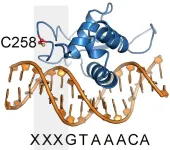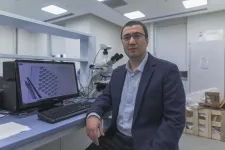(Press-News.org) Bonobos, endangered great apes that are among our closest relatives, might be more vulnerable than previously understood, finds a genetics study led by a UCL researcher that reveals three distinct populations.
The three groups of bonobos have been living separately in different regions in Central Africa for tens of thousands of years, according to the study published in Current Biology by an international research team co-led by UCL, University of Vienna, and Max Planck Institute for Evolutionary Anthropology scientists.
Using genetic tests, the researchers confirmed previous evidence suggesting that there are three distinct groups of bonobos, originating in central, western, and far-western regions of the bonobo range. By quantifying the differences between these groups, the research team found that they can be as different from one another as the most closely-related chimpanzee subspecies.
Bonobos, commonly seen as the peace-loving primate, are, together with chimpanzees, the closest living relatives to humans as our genomes differ from theirs in only 1% of genetic bases.
The bonobo is endangered, with about 20,000 individuals alive in the wild, and are the most understudied great ape as they live exclusively in the Congo Basin of the Democratic Republic of the Congo, where social unrest has constrained research activities.
Joint first author Dr Sojung Han (University of Vienna, Austria, and Institut de Biologia Evolutiva, Spain) said: “Bonobos are a fascinating species, very closely related to humans, with unique patterns of social behaviour. They live in tight social groups which, despite some conflicts, are markedly peaceful and egalitarian. Interestingly, males stay in their birth social group while females migrate across groups, but females still form close alliances and can have higher dominance than males.”
The research team analysed the genomic data of 30 bonobos born in the wild but now living in captivity. They sequenced the exomes (the protein-coding part of the genome) of 20 individuals living in an African sanctuary and analysed the full genomes of 10 other bonobos. While they could not always be certain what region of the Congo basin each bonobo had originated in, the researchers cross-referenced their dataset with previously published mitochondrial DNA data collected from 136 wild bonobos to paint a fuller picture of genetic diversity across the animal’s range.
The researchers estimated that the central group diverged from the other two groups 145,000 years ago, with the two western groups diverging 60,000 years ago, with little mixing between the groups ever since.
Lead author Professor Aida Andrés (UCL Genetics Institute) said: “Bonobos may be even more vulnerable than previously thought, as their population actually consists of at least three smaller populations, some of which may historically have been amongst the smallest across similar primates.
“In order to survive, every species needs sufficient genetic diversity to adapt to a changing environment, and for bonobos, losing one of these three groups would be a devastating loss to the total genetic diversity of the species. It is vital that all three groups of bonobos are conserved in order to protect this fascinating and charismatic species.”
The researchers say the differences between the bonobo groups should be further studied and considered in conservation efforts when planning efforts such as habitat preservation, translocations or potential reintroductions in case individuals are adapted to specific environments.
Dr Sojung Han said: “Unlike modern humans, who are spread all over the world, bonobos are limited to the Congo basin, but our work shows that there are indeed genetic differences between groups. This is exciting, and it will be very interesting to study, in the future, if there are any differential adaptations among these groups.”
Joint first author Dr Cesare de Filippo (Max Planck Institute for Evolutionary Anthropology, Germany) said: “This work demonstrates how studying the genomes of endangered species can help better understand their populations and eventually aid conservation efforts. Even the genomes of captive individuals can help us, sometimes, understand their wild populations. Our findings show he vulnerability of bonobos as an endangered species, and stress the need to protect their environment to ensure their conservation."
The research was supported by Wellcome and the Max Planck Society, and involved researchers based in the UK, Austria, Germany, Spain, Denmark, and Israel.
END
Bonobos may be more vulnerable than previously thought, suggests genetics study
2024-10-15
ELSE PRESS RELEASES FROM THIS DATE:
Scripps Research scientists discover chemical probes for previously “undruggable” cancer target
2024-10-15
LA JOLLA, CA—Hormone-driven cancers, like those of the breast and prostate, often rely on a tricky-to-target protein called Forkhead box protein 1 (FOXA1). FOXA1 mutations can enable these types of cancers to grow and proliferate. Today, FOXA1 is notoriously difficult to block with drugs—but that may soon change.
Scripps Research scientists have identified a crucial binding site on FOXA1 that could pave the way for future cancer treatments. The team’s findings, which were published in Molecular Cell on October 15, 2024, also mapped out how tiny drug-like chemical compounds—called small molecules—interact with the protein.
While ...
Giant Magellan telescope begins primary mirror support system testing
2024-10-15
TUCSON, AZ — October 15, 2024 — The Giant Magellan Telescope today announced the successful installation of one of its completed 8.4-meter-diameter primary mirrors into a support system prototype at the University of Arizona’s Richard F. Caris Mirror Lab. This highly sophisticated system — comparable in size to half a basketball court and containing three times the number of parts of a typical car — is vital to the telescope’s optical performance and precision control. The milestone marks the start of a six-month optical testing phase to demonstrate that the support system can control the mirror as required, validating the revolutionary capabilities ...
Experimental cancer drug eliminates bone metastases caused by breast cancer in lab models
2024-10-15
In a new study led by Johns Hopkins Medicine, the drug RK-33 has demonstrated promise in treating breast cancer that has spread to the bone (breast cancer bone metastasis). RK-33 was previously shown to help treat other types of cancer and viral illnesses.
Patients with breast cancer and bone metastasis have limited treatment options and often rely on palliative care to ease difficult symptoms, including frailty and pain. In most cases, breast cancer with bone metastasis is incurable.
Now, corresponding author Venu Raman, Ph.D., ...
Political candidates who fight climate change stand to benefit in election
2024-10-15
A majority of Floridians expressed support for political candidates who fight climate change in a new Florida Atlantic University survey. The survey found that nearly 52% of respondents agreed that a candidate with a record of reducing climate impacts was more likely to get their vote.
The Invading Sea’s Florida Climate Survey also revealed strong support in the state for increasing renewable energy use and teaching climate science in K-12 classrooms. The survey is the 11th conducted by the FAU Center for Environmental Studies ...
Stand up to Cancer announces new grants supporting pioneering research in six cancer types
2024-10-15
LOS ANGELES – Oct. 15, 2024 – Stand Up To Cancer® (SU2C) today announced grants to several teams of leading cancer investigators in support of cutting-edge research in a variety of cancers including head and neck, pediatric, pancreatic, breast, rectal and gastro-esophageal cancers, as well as research focused on how the microbiome communicates with the immune system.
“These new grants emphasize SU2C’s support of collaborative, trailblazing research that pushes the field forward and helps people impacted by some of the most common or difficult-to-treat cancers,” said Julian Adams, Ph.D., president and CEO of SU2C. “With an emphasis on answering ...
Researchers awarded $1.3M to help military Veterans battling Acute Myeloid Leukemia
2024-10-15
CLEVELAND—With a new four-year, $1.3 million grant from the U.S. Department of Veterans Affairs, researchers at Case Western Reserve University are investigating a new approach to treat Acute Myeloid Leukemia (AML) in military Veterans.
AML is the most common form of blood cancer in adults, and many patients suffer relapses—especially Veterans, due to exposure to harmful chemicals and radiation during active duty, according to the National Center for Biotechnology Information.
There is no effective treatment for AML and, according to the National Institutes of Health, half of treated patients suffer a relapse after therapy—mainly ...
New hub for high-energy astrophysics — CTAO Science Data Management Centre opens at DESY in Zeuthen
2024-10-15
Zeuthen, Germany – On 14 October 2024, the Cherenkov Telescope Array Observatory (CTAO), along with hosting partners and shareholders Deutsches Elektronen-Synchrotron DESY, celebrated the official inauguration of the Science Data Management Centre (SDMC) on the DESY campus in Zeuthen, Germany.
The ceremony, chaired by Prof. Christian Stegmann, Head of DESY Zeuthen, was opened by Mario Brandenburg, Parliamentary State Secretary at the German Federal Ministry of Education and Research (BMBF), and Tobias Dünow, State Secretary at ...
JMIR publications CEO and Executive Editor Gunther Eysenbach achieves #1 ranking as most cited researcher in Medical Informatics for fifth consecutive year
2024-10-15
Toronto, ON (October 14, 2024) – JMIR Publications is proud to announce that Gunther Eysenbach, founder, CEO and executive editor, has once again been named the #1 most cited researcher in the subfield of medical informatics by Stanford/Elsevier’s Top 2% Scientists rankings. This marks the fifth consecutive year that Dr Eysenbach has secured this prestigious position, reaffirming his status as a leading authority and driving force in the field. He is also ranked #36 in the Top 100 Scientists in Information & Communication ...
ERC grant for groundbreaking wearable health tech
2024-10-15
Dr. Levent Beker from the Department of Mechanical Engineering at Koç University, once again received European Research Council (ERC) support for his scientific research that focuses on improving the quality of our daily lives.
His previous project on an implant that can detect signs of heart failure and degrade in the body without surgery was granted €2.5 million Starting Grant from the ERC. Last year, his research on a wireless micro sensor that enables real-time monitoring of food spoilage at supermarkets, was published in Nature FoodMagazine.
Currently leading the Bio-integrated ...
NIH announces winners of prize competition to improve postpartum maternal health and health equity through innovative diagnostics
2024-10-15
The National Institutes of Health (NIH) has announced the winners of the Rapid Acceleration of Diagnostics Technology (RADx® Tech) for Maternal Health Challenge, an $8 million prize competition to encourage development of postpartum maternal health diagnostics for use in regions that have limited access to maternity care. The eight winning teams developed home-based and point-of-care diagnostics, wearables and other accessible technologies to improve postpartum health outcomes during the period when most maternal deaths occur—up to one year after delivery or the end of ...








